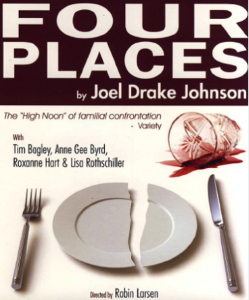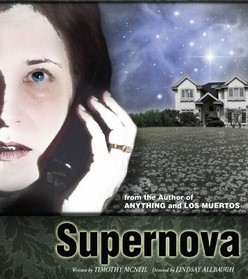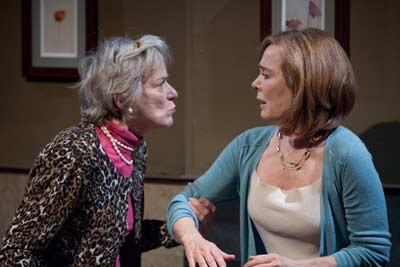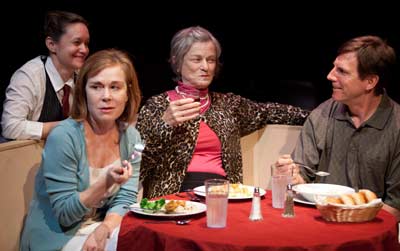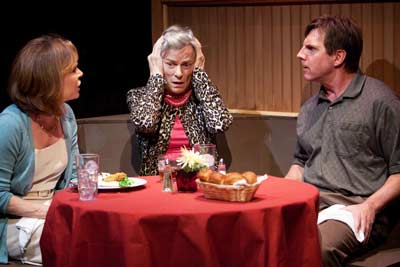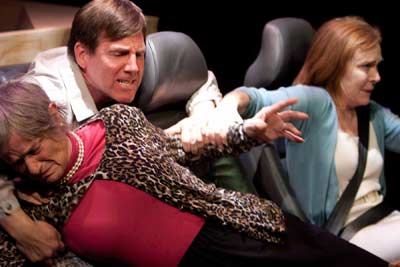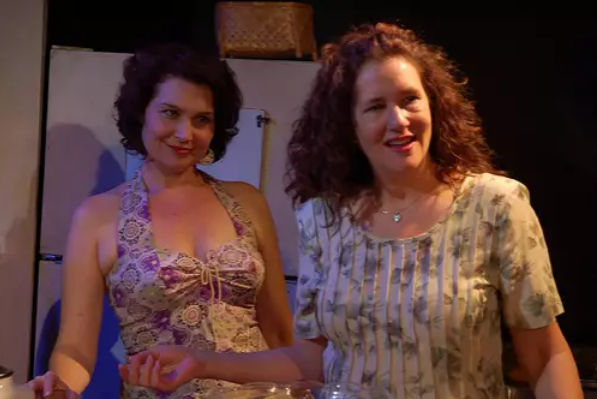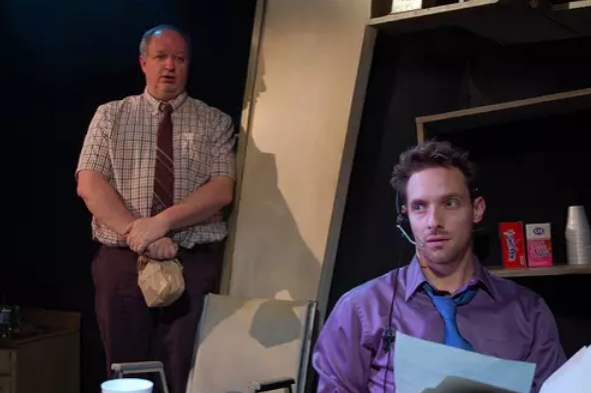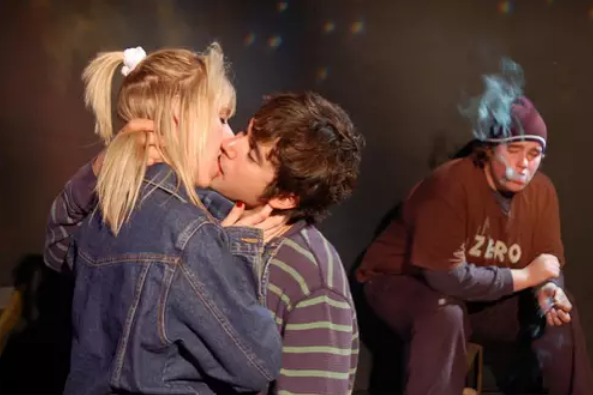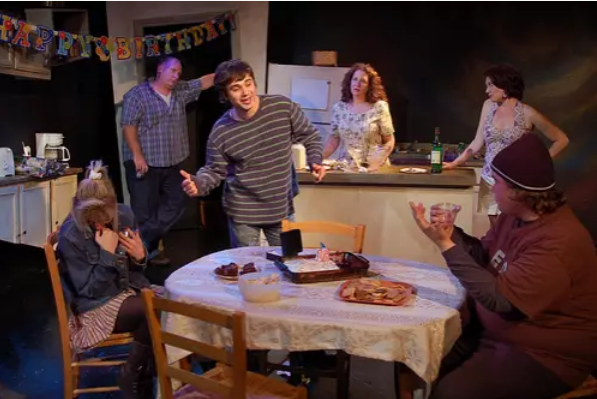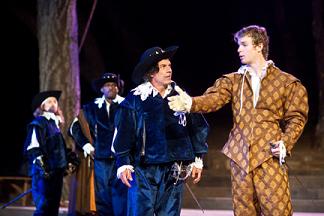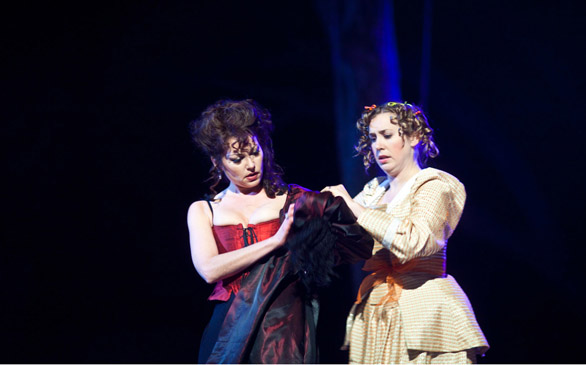ALL OVER TOWN: FROM HOLLYWOOD TO TOPANGA
After all is said and sat through, there is no profoundly new revelation in Joel Drake Johnson’s carefully observed Four Places that would finally illuminate the wrenching drama that takes place, but it is nevertheless invigorating to hear the cool intelligence of the writing and the way the play sneaks up on you, moment by moment, until we are caught up in a vise of family guilts and recriminations. It is also the best-acted play in Los Angeles at the moment. And the effective way the 30-seat space at Theatre/Theater is used is exemplary. Rarely has smallness seemed such a virtue.
This Rogue Machine production gives us a brother and sister, Warren and Ellen, who pick up their mother on a Sunday afternoon to go to what is a regularly scheduled luncheon at an upscale restaurant where the mother, Peggy, is so comfortable and familiar that she seems to have more affection for (and interest in) the waitress, Barb, than she does for her own children. Slowly but certainly, it oozes out that this is no ordinary Sunday lunch. Peggy dithers a bit but there is little hint that she might be dangerous to herself (which is not at the center of Warren and Ellen’s concern), though she may well be to her aging husband, whom his children are eager to protect, no matter what serious collateral damage they might create in the process (even, as it becomes increasingly apparent, to themselves).
The play, though stylized, as all good plays are, is grounded in reality, thanks primarily to the perfectly realized performances of its superb cast. Tim Bagley and Roxanne Hart cloak their sibling rivalry under a mantle of shared exasperation that is so clammily authentic you would run away from them if you didn’t happen to recognize in them one’s own impulses under similar circumstances. That they are suffused with heartbreak, both in their own skins and as brother and sister, is due to the painful places the two actors are willing to take their characters. Lisa Rothchiller’s Barb proves there is no such thing as a small part by the way she subtly becomes every waitress you’ve ever been served by: charming and solicitous and, at the very same time, irritating and pushy.
But it is Anne Gee Byrd’s Peggy who, if the play gives you sleepless nights, will genuinely haunt you. It is so much like watching a person emotionally unravel before you that it is hard to think of it as acting at all. When her eyes start darting around in desperation and fear, looking for some uncharted way out of her intensifying dilemma, our closeness to her as an audience becomes unbearable but transfixing.
Robin Larsen’s sharp-edged and crisp direction is sympathetic to every new nuance which playwright Johnson comes up with; it is also lively and – perhaps you’ll be surprised to hear this – devastatingly funny. The play does walk a thin line between the comic and the tragic, without falling uneasily into either. Mention should be made of the stunning way Mark Guirguis has used the space. A car, which takes the three central characters from home to restaurant and back, revolves and becomes a table in the restaurant. The walls of the limited space become the waiting room and a ladies’ rest room and tell you all you need to know about the restaurant where it all takes place. And when Peggy washes her hands, listen to the witty sound Veronica J. Lancaster has come up. This is what occurs when no detail is too small. Four Places is very much in good hands. You might call it a masterpiece in miniature.
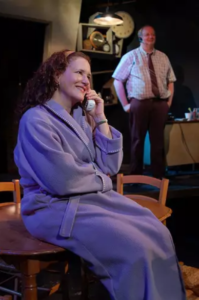 I wish I could say the same for the Elephant Theatre Company production of Timothy McNeil’s Supernova. The problem begins with the play itself, which seems to want to revive kitchen-sink drama and simultaneously condemn the genre. The Davies family live in an ugly pile-up of garish trashiness. What is it about Mabel, the matriarch of this crude menagerie, that keeps her in this place? Her husband, pants unbuttoned, is constantly in front of the TV set. Her son, Kip, is having a corrosively violent sexual relationship with an alcoholic divorcee who lives somewhere nearby, presumably under the same dire conditions, while, with his school chums in tow, he lashes out at the world with the myopic (and largely unexplored) viciousness of a Tea Party member. The major event of the play is Kip’s eighteenth birthday party and the gift Mabel wants to buy for him, a watch that has been advertised in the pages of a Soldier of Fortune magazine, which has been sullying up the Davies kitchen.
I wish I could say the same for the Elephant Theatre Company production of Timothy McNeil’s Supernova. The problem begins with the play itself, which seems to want to revive kitchen-sink drama and simultaneously condemn the genre. The Davies family live in an ugly pile-up of garish trashiness. What is it about Mabel, the matriarch of this crude menagerie, that keeps her in this place? Her husband, pants unbuttoned, is constantly in front of the TV set. Her son, Kip, is having a corrosively violent sexual relationship with an alcoholic divorcee who lives somewhere nearby, presumably under the same dire conditions, while, with his school chums in tow, he lashes out at the world with the myopic (and largely unexplored) viciousness of a Tea Party member. The major event of the play is Kip’s eighteenth birthday party and the gift Mabel wants to buy for him, a watch that has been advertised in the pages of a Soldier of Fortune magazine, which has been sullying up the Davies kitchen.
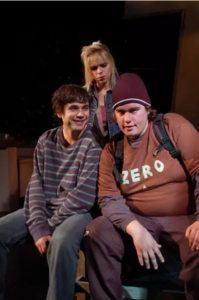 It’s a mail-order watch and, right into the middle of this mess, McNeil introduces the relationship which separates itself from the kitchen-sink atmosphere – between Mabel and Joe Strong, the gentle watch salesman who is new to the job but very wise to the ways of understanding lonely people. Naturally, Joe offers an escape from Mabel’s grotesque world. But escapes from reality are hard to come by, a fact which does not deter Mabel from finally making the attempt, so that we can walk out of the theater feeling a little bit better about her possibilities which, in real life, hardly exist.
It’s a mail-order watch and, right into the middle of this mess, McNeil introduces the relationship which separates itself from the kitchen-sink atmosphere – between Mabel and Joe Strong, the gentle watch salesman who is new to the job but very wise to the ways of understanding lonely people. Naturally, Joe offers an escape from Mabel’s grotesque world. But escapes from reality are hard to come by, a fact which does not deter Mabel from finally making the attempt, so that we can walk out of the theater feeling a little bit better about her possibilities which, in real life, hardly exist.
It’s the trash element – this walking boldly into territory Tracy Letts has made his own – that dominates the play. Joel Daavid’s set might put everything at a tilt, and place windows and doors where floor tiles should be, but kitchen-sink is kitchen-sink no matter what you do to comment upon it. And the play almost cries out for the kind of sloppy direction Lindsay Allbaugh provides, in which the opening of every beer can is noisily underscored. And Edward Tournier should probably be praised for playing Kip as the flabbiest and cruelest piece of vermin on the face of the earth. The other actors create verisimilitude but very little reality.
This is the first Timothy McNeil play this reviewer has seen and so I am not on the same wavelength as the other Los Angeles reviewers who have heaped so much praise upon this work. I begin to understand what they are talking about when I think of the eloquence with which McNeil has written parts for himself and his wife, actress Bonnie McNeil. McNeil’s Joe Strong is quietly persuasive and Ms. McNeil brings a tender lyricism and natural grace to the damaged goods known as Mabel Davies. Their fine performances save the play from itself.
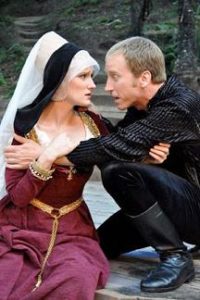 Light years away, in that lovely bit of woodside real estate in Topanga Canyon known as The Will Geer Theatricum Botanicum, they are doing what they have been doing for quite some time now: providing picnicky entertainment for a family’s outing on a balmy summer night. Except for the unseasonable cold these days, it’s the kind of theater that is beyond criticism. Who doesn’t like Shakespeare played in a wooded glen where the field mice frolic along with the actors?
Light years away, in that lovely bit of woodside real estate in Topanga Canyon known as The Will Geer Theatricum Botanicum, they are doing what they have been doing for quite some time now: providing picnicky entertainment for a family’s outing on a balmy summer night. Except for the unseasonable cold these days, it’s the kind of theater that is beyond criticism. Who doesn’t like Shakespeare played in a wooded glen where the field mice frolic along with the actors?
But the lack of stringency and innovation in Ellen Geer’s productions of Hamlet and Alexander Dumas’s The Three Musketeers do beg for a bit of “Bah, humbug!” from someone who takes theater seriously. Her Hamlet is almost a comedy, trimmed down to a speedy two hours and fifteen minutes, its cuts making it sound less like the Hamlet we know and love and more like a compendium of all the famous quotable lines from Hamlet. Hamlet does not seem to have come home for his father’s funeral but rather to have a bit of fun in Elsinore, a respite from continuing his studies at Wittenberg. He does seem to be having a good time, and, to some extent, we do, too, since Mike Peebler’s briskly played Hamlet is, at its best, a delight to watch. But once the bodies start piling up, after intermission, what does a guy – one who wants to have a good time – do? And it is interesting to note, once Hamlet tells the strolling players how to be natural and hold a mirror up to the world, how much overacting begins to take place. In its more comic mode, everyone is engaging. The fact that nobody seems to be wrestling with the tragedy at hand manages to leave the actors somewhat stranded at just that moment when we need them most to quietly contemplate their respective fates.
The Three Musketeers is much better. The sword play, though hardly dazzling, is entertaining. Aaron Hendry, who is far too young to be a good Claudius, redeems himself with a brilliantly played Duke of Buckingham. The always reliable William Dennis Hunt makes a nice impact as the villainous Richelieu. And Abby Craden is bent on getting all the juice out of Milady that is humanly possible. It is more all right for The Three Musketeers to be bright and swift than it is for Hamlet. But still, one might wish that it hadn’t been reduced to the adventures of a callow and bumbling youth – a d’Artagnan closer perhaps to Dumas’s image of him than our own – trying so desperately to be the fourth musketeer. One knows he will become that; it might be more charming and certainly more powerful to watch the richness of his maturing process. A boy becoming a man is infinitely more fascinating than a boy becoming a swordsman.
Ah, well, one is outdoors under the stars, the performers try so hard and, if you keep your eyes on them and not on the wee woodland animals that play around the edges of the stage, and have a glass or two of hearty red before taking your seat, there are worse ways to spend a summer evening. Much worse.
Four Places
Rogue Machine
Theatre/Theater, 5041 Pico Boulevard in Los Angeles
ends on July 3, 2010 EXTENDED to August 29, 2010
for tickets, visit Rogue Machine
photos by John Perrin Flynn
Supernova
Elephant Theatre Company
Elephant Space Theater in Hollywood
ends on June 27, 2010
for tickets, visit Plays411
photo by Joel Daavid
Hamlet and The Three Musketeers
Will Geer’s Theatricum Botanicum
1419 N. Topanga Canyon Blvd. in Topanga
ends on October 3, 2010
for tickets, call 310-455-3723 or visit Theatricum
photos by Miriam Geer
